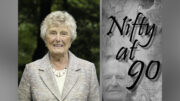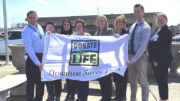NEW YORK (AP) — The coronavirus outbreak has thrown at least 16.8 million Americans onto the unemployment rolls in just three weeks, underscoring the terrifying speed with which the crisis has brought world economies to a near standstill.
Meanwhile, world leaders and health officials are fervently warning that hard-won gains in the fight against the scourge must not be jeopardized by relaxing social distancing during the Easter holiday.
A spike in deaths in Britain and New York and surges of reported new infections in Japan and in India’s congested cities make it clear the battle is far from over.
Numbers released by the U.S. government on Thursday showed that 6.6 million workers applied for unemployment benefits last week, on top of more than 10 million in the two weeks before that. That means more than 1 in 10 American workers have been forced out of a job since the crisis took hold.
The real numbers could be even higher because the surge of jobless claims has overwhelmed state unemployment offices around the country, and some people have been unable to get through by telephone or website. And still more job cuts are expected.
The U.S. unemployment rate could hit 15% — a number last seen at the tail end of the Depression — when the figures for April come out.
The aid organization Oxfam International warned of a looming spike in global poverty, estimating that around half a billion people worldwide could be pushed into poverty if wealthier nations do not take urgent action.
Dr. Anthony Fauci, the top American infectious-diseases expert, said the epidemic will demand permanent changes in people’s behavior until a vaccine is developed. He said people should be constantly washing their hands and those who are sick should not go to school or work.
“Don’t anybody ever shake hands again,” he said. “I mean, it sounds crazy, but that’s the way it’s really got to be until we get to a point where we know the population is protected.”
He also shot down hopes that warmer spring weather would bring an end to the crisis.
“One should not assume that we are going to be rescued by a change in the weather,” he said. “You must assume that the virus will continue to do its thing.”
The U.S. has by far the most confirmed infections with over 430,000, three times the number of the next three countries combined. New York state on Wednesday recorded its highest one-day increase in deaths, 779, for an overall death toll of almost 6,300. New York has more than 40% of the U.S. death total of around 15,000.
“We are flattening the curve because we are rigorous about social distancing,” New York Gov. Andrew Cuomo said. “But it’s not a time to be complacent.”
German Chancellor Angela Merkel emphasized that “even short trips inside Germany, to the seaside or the mountains or relatives, can’t happen over Easter this year.”
New Zealand police warned people not to drive to holiday homes over Easter or risk arrest, while Lithuania moved to lock down major cities. Portugal halted commercial flights at the country’s five international airports and set up checkpoints on major roads to stop Easter visits.
Greece also tightened restrictions ahead of next week’s Orthodox Easter, increasing roadblocks along highways, doubling fines for lockdown violations and banning travel between islands.
Iran’s Supreme Leader Ayatollah Ali Khamenei suggested mass gatherings may be barred through the holy Muslim fasting month of Ramadan, which runs from late April through most of May.
Khamenei urged the Shiite faithful to pray at home. Shiites typically pray together and communities often share meals, especially during Ramadan. Iran has reported over 66,000 infections and over 4,100 deaths, although experts suspect those numbers under-report the country’s outbreak.
Indonesia’s president banned civil servants, police officers, military personnel and employees of state-owned companies from returning to their hometowns to celebrate the end of Ramadan. The annual event usually involves tens millions of Indonesians crisscrossing the archipelago of 17,000 islands.
Britain’s Prime Minister Boris Johonson spent a third night in intensive care with COVID-19 infection. His spokesman said Thursday he was continuing to improve. Britain posted its highest death toll in a single day Wednesday, with 938 virus-related deaths.
Japan reported more than 500 new cases for the first time Thursday, a worrisome rise since it has the world’s oldest population and COVID-19 can be especially serious in the elderly.
Prime Minister Shinzo Abe has declared a state of emergency, but not a lockdown, in Tokyo and six other prefectures. Companies in the world’s third-largest economy have been slow to embrace working from home, and many commuters jammed Tokyo’s streets as usual Thursday.
New infections, hospitalizations and deaths have been leveling off in hard-hit Italy and Spain, which together have more than 32,000 deaths, but the daily tolls are still shocking. Spain reported 683 more deaths Thursday, bringing its total to more than 15,200.
Spanish Prime Minister Pedro Sánchez acknowledged authorities were caught off guard by the crisis and failed to provide hospitals with critical supplies, including virus tests and protective clothing for medical workers.
“Europe reacted late. All of the West reacted late, and Spain is no exception,” Sánchez said.
Worldwide, the number of confirmed COVID-19 cases has climbed to nearly 1.5 million, with nearly 90,000 deaths, according to Johns Hopkins University. The true numbers are much higher, because of limited testing, different rules for counting the dead and the efforts of some governments to conceal the extent of their outbreaks.
For most, the virus causes mild to moderate symptoms like fever and cough. But for some, especially older adults and the infirm, it can cause pneumonia. More than 330,000 people have recovered.








































